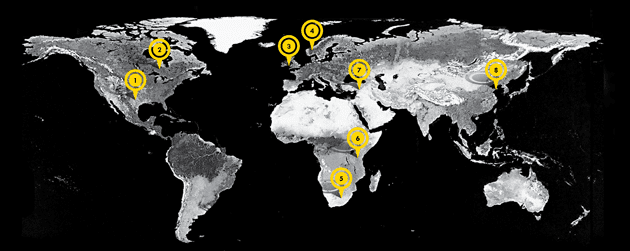United States
A proposal by OSHA that would require new and producing oil wells to satisfy process safety
management standards that apply to other industrial operations has been opposed by more than a dozen oil companies and trade groups who claim that existing standards are adequate.
The possible new regulations are driven by concerns that reported deaths in the industry nationwide reached a 10 year high in 2012.
Number crunching by researchers at Texas A&M Engineering Experiment Station shows a fatality rate of 24.2 per 100,000 employees’ for oil and gas extraction workers compared with 1.7 per 100,000 workers in the chemical manufacturing sector.
Source: SprayFoam.com, Inc, 16 April 2014
[/tab] [tab title=”2 Can”]Canada
A mandatory training requirement for all Ontario workplaces will take effect from 1 July 2014.
The health and safety training module will be non-negotiable and has been designed to force a dialogue between businesses and workers as to what kind of hazards may exist at a particular workplace.
“…it really speaks to a culture of preventeeism, where businesses and workers are pro-actively working towards building a safe working environment,” said the Ontario Minister for Labour.
Source: CosMag, March 2014
[/tab] [tab title=”3 UK”]United Kingdom
A new study published in the Proceedings of the National Academy of Scientists conducted by British researchers indicates that sleeping during the day disrupts the rhythms of about one-third of human genes.
It also suggests that it appears to be more disruptive than not getting enough sleep.
Professor Derk-Jan Dyk of the University of Surrey said that quite fundamental processes are being affected and may be related to the negative health outcomes associated with long-term shift work i.e. obesity, diabetes, high blood pressure, heart disease and cancer.
The study didn’t directly connect health problems and night shift work but experts say it does start to help them understand why sleep might have such a powerful influence on a person’s health.
Source: MedicineNet, January 2014
[/tab] [tab title=”4 Swed”]Sweden
The Centre for International Law (CIEL) and Client Earth have criticised a joint recommendation by the Chemical Industry Councils of Europe and the USA to set up a joint scientific committee and increase the use of cost-benefit analysis before any regulation of the chemical industry is introduced.
They claim that the chemical industry’s proposals are a strategy aimed at slowing down the adoption of legislation concerning chemicals that interfere with hormonal systems, such as endocrine disrupting chemicals.
Sweden is threatening to sue the European Commission if it does not take action within two months to adopt criteria for identifying endocrine disruptors.
Endocrine disruptors are chemicals that disrupt the hormonal system and are raising concerns of a possible link with a range of chronic diseases (some cancers, diabetes, obesity etc).
The European Commission was supposed to publish an EU strategy on endocrine disruptors and the scientific criteria for identifying them in December 2013.
Source: ETUI Health and Safety News, 6 March 2014
[/tab] [tab title=”5 SA”]South Australia
An unauthorised strike first begun in January, prompted platinum producer, Lonmin, to sack 235 workers from their South African mine in May.
According to Lonmin spokesman Happy Nkhoma, the strike started on 23 January, with the Association of Mineworkers and Construction Union (AMCU) demanding higher wages for their members.
Nkhoma told local media that those fired were essential services workers who were not allowed to down tools, under an agreement with the AMCU.
“A court order to this effect was obtained on 27 February requiring all essential workers to return to work by 12 May,” Nkhoma said.
The AMCU had demanded that workers’ salaries be doubled to R12,500 ($US1,197) as base pay, along with other benefits. The union had earlier rejected an offer proposing to give workers a total package of R12,500.
The company claims it has lost a third of its production for the whole year since the strike began.
[/tab] [tab title=”6 Moz”]Mozambique
At least ten miners died when the shaft of an illegal gold mine collapsed in the Nampula province of Mozambique in May. Up to five others may still be missing.
It’s believed around 40 people were inside the 12m-deep hole at the time of incident, however due to the illegal nature of the mine, this number is impossible to confirm.
Locals started frantically digging by hand to rescue the trapped miners as they waited for firefighters and police sent by provincial authorities to help in the rescue effort. Rescue efforts continued for six days before the authorities conceded that there was little chance of finding survivors alive.
According to state-run Radio Mozambique, authorities had ordered the closure of the mine in April, however the order was ignored by locals who continued mining the site. Authorities have now confiscated the equipment used by the illegal miners.
[/tab] [tab title=”7 Tur”]Turkey
301 miners have been confirmed killed after an explosion ripped through an underground coal mine in Turkey in May.
Efforts to rescue the trapped miners saw crews attempting to pump clean air into the shaft containing the men, located approximately two kilometres underground and four kilometres from the entrance. However thick smoke hampered rescue efforts.
According to the ABC, Turkey’s Energy Minister, Taner Yildiz, said a total of 787 mine workers were underground at the time of the explosion with 212 evacuated shortly after the incident.
A faulty electrical transformer is being blamed for triggering the explosion at the mine located in the Soma district of Turkey.
Turkey’s Department of Labour and Social Security issued a statement saying the mine was last inspected on March 17 and was found to be compliant with safety regulations.
[/tab] [tab title=”8 Chi”]China
Chinese scientists have warned that the country’s toxic air pollution is now so bad that it resembles a nuclear winter, slowing photosynthesis in plants – and potentially wreaking havoc on the country’s food supply.
The worsening air pollution has already exacted a significant economic toll, grounding flights, closing highways and keeping tourists at home.
Beijing’s concentration of particle matter – small enough to penetrate deep into the lungs and enter the bloodstream – hit 505 micrograms per cubic metre recently. The WHO recommends a safe level of 25.
Source: Chemwatch Bulletin Board 29 March 2014
[/tab] [/tabs]













Add Comment